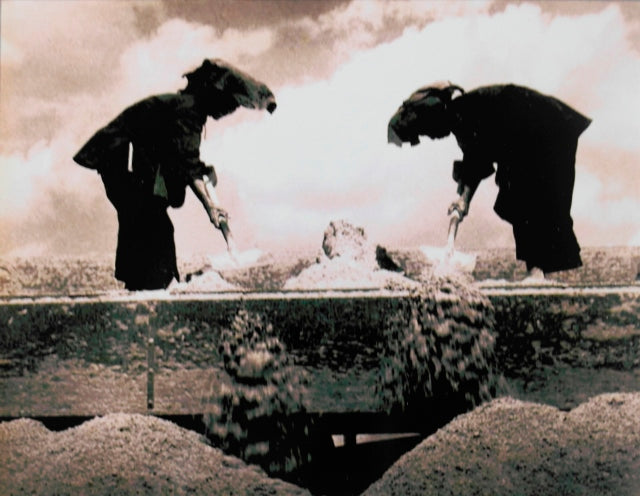Eagle's Eye Art Gallery
The Samsui Women
The Samsui Women
Couldn't load pickup availability
Photograph Print by Yip Cheong Fun.
This artwork is mounted on matboard.
Down Memory Lane in Singapore:
The Samsui Women
Samsui women were actually the heroines of a bygone era. Their heroic story is written all over Chinatown, but more particularly in various construction projects all over Singapore during the period 1930 to the end of the 20th Century. They became heroines out of dire necessity. It was the era and the circumstances that made them strong, challenging them to face the harsh realities of grit and determination.
Around the 1930s, the colonial authorities started to curb the flow of male Sinkhehs into Singapore but they allowed the free flow of women and children into the country. This was done in order to attain a proper balance in the ratio of women to men in the immigrant population. So, many single women came to Singapore from the Guangdong province to work, and they proved equal to the challenge of rough work. They are called Samsui women because they came from the Samsui district. But there were others from Sun Yap, Fah Yuen, Dongguan and Hock San. Though most of them wore their distinctive red headgear, some wore blue on festive occasions. Those from Sun Yap wore blue most of the time.
Whatever their origins, the Samsui women have become shining examples of matured womanhood - reliable, resilient, responsible and resolute. They are symbolic of the spirit of endeavour of the early immigrants in Singapore. Though some women became domestic servants or otherwise followed more lucrative and less onerous avenues of work, most of these women who came barefoot and hopeful of a new life in Singapore, had to endure rough work alongside the men in the fields and in work sites. Their courage and independence and the way they laboured and struggled, earned them a place in Singapore`s history. Their story had become an essential part of Singaporean women`s history, and they have been regarded as a symbol of female independence, resilience and courage in Singapore.
More importantly, they have given Singapore a significant part of the heritage of endeavour. This photo by Yip Cheong-Fun, like the granite sculpture of these women in front of the URA Building, home of Singapore`s planners and builders, is a worthy tribute to this group of Singapore pioneers, and succinctly captured the struggle and perseverance of these tough women.
This picture, like many pictures Yip had taken in his career, shows his prevailing interest in the human condition. His dramatic style is shown here. The image subtly highlights an action, resembling otherworldly portraits and produces a fascinating mood. More importantly, he captures a portrait of historical interest.
Share


